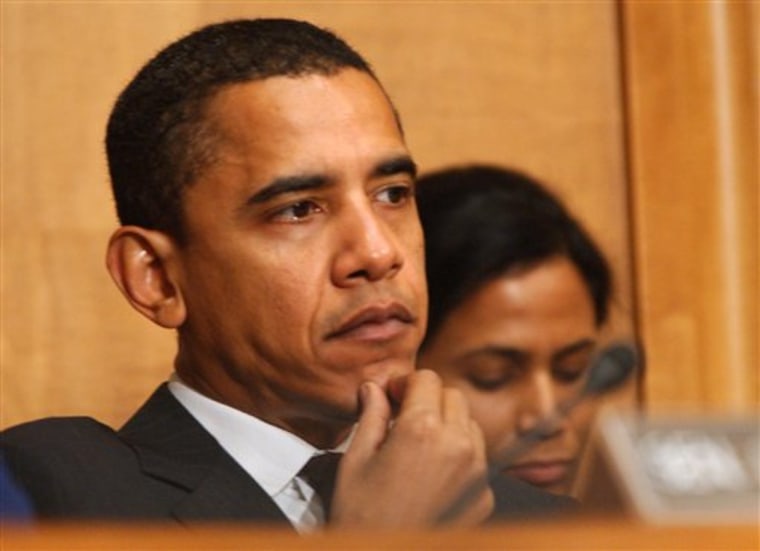Barack Obama may find that for black voters in South Carolina, being black isn't everything.
If there is a single state where being black holds the potential to boost Obama's chances to win the Democratic presidential nomination, South Carolina fits the bill.
Yet, Democratic voters and party officials here said the Illinois senator will have to do as much persuading as any other candidate to win the support of blacks, who make up about half the Palmetto State's Democratic voters.
"I'm looking for reality," said Tremaine Hendrick, a 20-year-old communications major at historically black Benedict College. "I want the truth. You've got to wait and see to learn actually who tells the truth. You can't determine that from what they're saying right now."
Palmetto State podium
The South Carolina Democratic primary on Jan. 29, 2008 is wedged into the political calendar one week after New Hampshire's first-in-the-nation primary and one week before what could turn out to be a make-or-break mega primary on Feb. 5 of as many as a dozen states.
If Obama were to do well here, it could provide the momentum needed for success in the upcoming crush of primaries.
Black voters accounted for 49 percent of vote in the 2004 Democratic primaries in South Carolina. By contrast, exit polls showed 1 percent of New Hampshire's 2004 Democratic primary voters were black.
That year, former Sen. John Edwards garnered 37 percent of the black vote in his native South Carolina and won its primary. He faces tough competition for the black vote from Obama and New York Sen. Hillary Rodham Clinton, who will make her first campaign stop in South Carolina on Monday.
This week, Clinton picked up endorsements from two black political leaders in South Carolina who backed Edwards in 2004.
Other candidates already have made it a point to campaign in South Carolina's black churches and weigh in on the continuing controversy over the Confederate flag flying on the Statehouse grounds, the subject of an ongoing NAACP boycott. But Democrats said no candidate should expect total support from blacks here.
"The black vote is big, but it's not monolithic," said state Democratic Party Chairman Joe Erwin. "Anyone who thinks that because Obama is black that lops off a huge percentage for him is mistaken."
Battle for endorsements
Obama is scheduled to campaign in Columbia on Friday afternoon - his first campaign trip to the state. The following day, he is to speak in Orangeburg at historically black Claflin College.
The biggest endorsement is House Majority Whip Jim Clyburn, D-S.C. but Clyburn told The Associated Press this week that he will not endorse any primary candidate in 2008.
Democratic state Sen. Robert Ford - who helped mobilize black voters for Edwards in 2004, but has switched to Clinton - said Obama, a first-term Illinois senator, has a lot to prove. "The media made this guy bigger than life," Ford said. "This guy isn't tested and they made him a rock star."
Ford said one reason he's backing Clinton is that he's skeptical Obama can win the presidency and worries his nomination could hurt other Democratic candidates.
"Every Democrat running on that ticket next year would lose - because he's black and he's top of the ticket. We'd lose the House and the Senate and the governors and everything," Ford said.
He drew widespread criticism for his comment on Tuesday, and later apologized.
Besides the flag and whether candidates support the boycott, political analysts say black voters in South Carolina worry about the same issues as blacks elsewhere. Chiefly, those are the Iraq war, health care and wages, said Furman University political scientist Danielle Vinson.
She predicted Obama would earn firm voter support only after speaking to those issues.
"He can only campaign on style for so long," she said.
Perry Jackson, a black 23-year-old Benedict student from Chicago, said some of his classmates still do not know much about the candidate, but campaign visits should help the senator.
"He seemed like a humble individual," said Jackson, who was impressed when he heard Obama speak at a junior college he attended before moving south.
Whitney Henderson, a 21-year-old black premed student at Benedict who supported John Kerry in 2004, said she remains uncommitted in the upcoming election, but is excited about Obama's bid.
"He's making history. No matter what happens, he's making history," she said.
